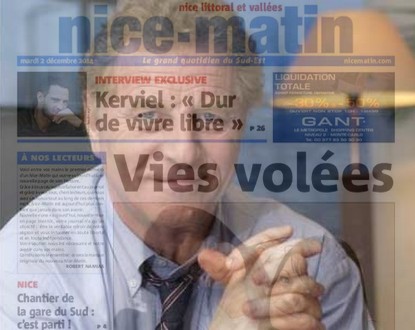The demeanor and tone are those of an experienced, informed, and confident professional… Robert Namias, with a prestigious past in the media world, has chosen a new challenge by taking the helm of a press group that may be ailing, but not dead!
 In receivership, the Nice-Matin group was saved from bankruptcy by a bold operation of social and solidarity capitalism. Now, it is a cooperative society owned by employees and investors.
In receivership, the Nice-Matin group was saved from bankruptcy by a bold operation of social and solidarity capitalism. Now, it is a cooperative society owned by employees and investors.
But the CEO, the “Master of Commander,” is he who will bear the heavy responsibility of getting the ship back afloat and ensuring it sails smoothly into the future.
Robert Namias, therefore, met, at the initiative of Paul Barelli, with colleagues from the local press for a presentation and exchange lunch, accompanied by his right-hand man, the number 2 of the editorial teams, Denis Carreaux.
“Our situation is fragile because the capital brought in is enough for the crisis exit plan but not for relaunching the newspaper,” he says, without hiding behind words. “But other investors could join us.”
The two press titles Nice-Matin and Var-Matin (editor’s note: the third was sold to La Provence as part of Bernard Tapie’s financing operation) must regain their management balance through a better equilibrium between the print and web editions.
It must be very rigorous because the opposite would be fatal to the operation’s success. It is the condition to avoid falling back into deficits and further cash flow tensions.
On the content side, a new organization of the editorial teams will gradually be implemented, and changes will occur gradually after an initial revamping of the front page.
Robert Namias’s experience, his perspective on facts—being someone from the outside—will allow him not to fall into the trap of friendships, collusions, and other complicities. “It’s not at 70 years old that I’m going to lose my freedom,” he sweeps aside the argument with a dismissive wave of the hand.
In terms of management, strictness will be essential, and the workforce needs to be reduced. Will the plan negotiated by the previous ownership (159 voluntary departures) be sufficient? It is certain that significant productivity gains must be achieved.
Two avenues have also been mentioned by the new “boss”: the use of the surplus spaces in the building on the Mercantour road by other co-tenants, and the possibility for the printing works to open to a new clientele. These operations require time and reflection but could provide valuable and lucrative aid in the income statement.
In the end, Robert Namias, whose contract runs for three years, has not forgotten that in these tough times, one must know how to let go of the “family jewels”: The real estate assets, valued at around forty million, will be subject to an uncompromising analysis.
Particularly, the land behind the headquarters could be included in some attractive real estate operations as part of the Plaine du Var operation. And why not, if it serves the common cause?
The adventure is admirable, and it is to Robert Namias’s great credit that he is putting himself back in the game when he could have been sharing his experience and knowledge in talks and conferences here and there.
To conclude, as he says himself: “I’ve been here for a short time, but I feel at ease.”
Wishing him all the best in his future endeavors.


